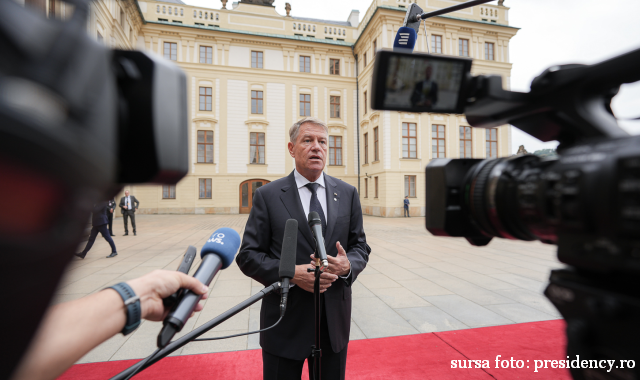European Political Community holds inaugural meeting
European democracies are closing ranks in face of many crises facing the continent.

Bogdan Matei, 07.10.2022, 14:00
Prague was on Thursday the European capital of democracy as the Czech rotating presidency of the EU Council hosted the inaugural meeting of the European Political Community (EPC), a French initiative bringing together not only EU and NATO member states, but also ex-Soviet states and states in the western Balkans that share the same values of freedom and human rights. Their presidents or prime ministers all condemned Russias invasion of Ukraine on 24th February and reaffirmed their unity and solidarity in the face of the warmongering regime of the Russian leader Vladimir Putin.
Romanias president Klaus Iohannis emphasised the need for a common European approach in respect of the profound security changes that are taking place and which call for a joint and strong response. According to a statement from the presidents office, Iohannis reiterated his call for determined and coordinated action in the face of Russias constant efforts to divide the continent. He also called for consolidating resilience mechanisms to address hybrid threats from Russia, underlining that reducing energy dependence, protecting the critical infrastructure and cyber security must be priority concerns. President Iohannis reiterated his countrys support for the neighbouring Ukraine and highlighted the complex efforts made by Romania in this respect, at a political, economic, financial, logistical and humanitarian level.
On Thursday, the number of Ukrainians crossing the border into Romania passed 2.5 million. Most of them have only transited the country on their way to western Europe, but according to the interior ministry in Bucharest, over 4,300 have requested and received asylum in Romania and are benefiting from all the rights stipulated in the national legislation. 70,000 have applied for stay permits and are benefiting from temporary protection.
Going back to the Prague meeting, Romania also used it as an opportunity to argue the case of its accession to the free movement Schengen area, something it has been waiting for for more than a decade, alongside Bulgaria, and since more recently, Croatia, despite fulfilling all technical criteria. President Iohannis told Radio Romanias correspondent in Prague that there is a chance Romania may be admitted into Schengen during the Czech presidency, namely by the end of the year, but that there are no guarantees this will happen.
“The need for unity in Europe has become even more clear with Russias war against Ukraine. This unity can be consolidated if Romania, Bulgaria and Croatia become part of the Schengen area, after so many years of waiting”, said the Romanian president. (CM)






























